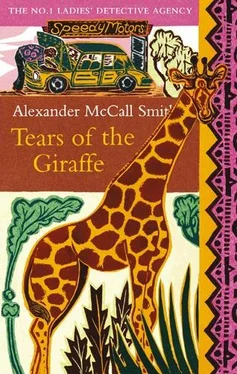"Well," said her friend, smiling wryly, "I can tell that you do think that. And you're wrong. Men choose women for jobs on the basis of their looks. They choose the beautiful ones and give them jobs. To the others, they say: 'We are very sorry. All the jobs have gone. We are very sorry. There is a world recession, and in a world recession there are only enough jobs for beautiful girls. That is the effect of a world recession. It is all economics.'"
Mma Makutsi had listened in astonishment. But she knew, even as the bitter remarks were uttered, that they were true. Perhaps she had known all along, at a subconscious level, and had simply not faced up to the fact. Good-looking women got what they wanted and women like her, who were perhaps not so elegant as the others, were left with nothing.
That evening she looked in the mirror. She had tried to do something about her hair, but had failed. She had applied hair-straightener and had pulled and tugged at it, but it had remained completely uncooperative. And her skin, too, had resisted the creams that she had applied to it, with the result that her complexion was far darker than that of almost every other girl at the college. She felt a flush of resentment at her fate. It was hopeless. Even with those large round glasses she had bought herself, at such crippling expense, she could not disguise the fact that she was a dark girl in a world where light-coloured girls with heavily applied red lipstick had everything at their disposal. That was the ultimate, inescapable truth that no amount of wishful thinking, no amount of expensive creams and lotions, could change. The fun in this life, the good jobs, the rich husbands, were not a matter of merit and hard work, but were a matter of brute, unshifting biology.
Mma Makutsi stood before the mirror and cried. She had worked and worked for her 97 percent at the Botswana Secretarial College, but she might as well have spent her time having fun and going out with boys, for all the good that it had done her. Would there be a job at all, or would she stay at home helping her mother to wash and iron her younger brothers' khaki pants
The question was answered the next day when she applied for and was given the job of Mma Ramotswe's secretary. Here was the solution. If men refused to appoint on merit, then go for a job with a woman. It may not be a glamorous office, but it was certainly an exciting thing to be. To be secretary to a private detective was infinitely more prestigious than to be a secretary in a bank or in a lawyer's office. So perhaps there was some justice after all. Perhaps all that work had been worthwhile after all.
But there was still this problem with the chickens.
"SO, MMA Makutsi," said Mma Ramotswe, as she settled herself down in her chair in anticipation of the pot of bush tea which her secretary was brewing for her. "So I went off to Molepolole and found the place where those people lived. I saw the farmhouse and the place where they tried to grow the vegetables. I spoke to a woman who had lived there at the time. I saw everything there was to see."
"And you found something?" asked Mma Makutsi, as she poured the hot water into the old enamel teapot and swirled it around with the tea leaves.
"I found a feeling," said Mma Ramotswe. "I felt that I knew something."
Mma Makutsi listened to her employer. What did she mean by saying that she felt she knew something? Either you know something or you don't. You can't think that you might know something, if you didn't actually know what it was that you were meant to know.
"I am not sure..." she began.
Mma Ramotswe laughed. "It's called an intuition. You can read about it in Mr Andersen's book. He talks about intuitions. They tell us things that we know deep inside, but which we can't find the word for."
"And this intuition you felt at that place," said Mma Makutsi hesitantly. "What did it tell you? Where this poor American boy was?"
"There," said Mma Ramotswe quietly. "That young man is there. "
For a moment they were both silent. Mma Makutsi lowered the teapot onto the formica tabletop and replaced the lid.
"He is living out there? Still?"
"No," said Mma Ramotswe. "He is dead. But he is there Do you know what I am talking about?"
Mma Makutsi nodded. She knew. Any sensitive person in Africa would know what Mma Ramotswe meant. When we die, we do not leave the place we were in when we were alive. We are still there, in a sense; our spirit is there. It never goes away. This was something which white people simply did not understand. They called it superstition, and said that it was a sign of ignorance to believe in such things. But they were the ones who were ignorant. If they could not understand how we are part of the natural world about us, then they are the ones who have closed eyes, not us.
Mma Makutsi poured the tea and handed Mma Ramotswe her mug.
"Are you going to tell the American woman this?" she asked "Surely she will say: 'Where is the body? Show me the exact place where my son is.' You know how these people think She will not understand you if you say that he is there somewhere but you cannot point to the spot."
Mma Ramotswe raised the mug to her lips, watching her secretary as she spoke. This was an astute woman, she thought. She understood exactly how the American woman would think, and she appreciated just how difficult it could be to convey these subtle truths to one who conceived of the world as being entirely explicable by science. The Americans were very clever; they sent rockets into space and invented machines which could think more quickly than any human being alive, but all this cleverness could also make them blind. They did not understand other people. They thought that everyone looked at things in the same way as Americans did, but they were wrong. Science was only part of the truth. There were also many other things that made the world what it was, and the Americans often failed to notice these things, although they were there all the time, under their noses.
Mma Ramotswe put down her mug of tea and reached into the pocket of her dress.
"I also found this," she said, extracting the folded newspaper photograph and passing it to her secretary. Mma Makutsi unfolded the piece of paper and smoothed it out on the surface of her desk. She gazed at it for a few moments before looking up at Mma Ramotswe.
"This is very old," she said. "Was it lying there?"
"No. It was on the wall. There were still some papers pinned on a wall. The ants had missed them."
Mma Makutsi returned her gaze to the paper.
"There are names," she said. "Cephas Kalumani. Oswald Ranta. Mma Soloi. Who are these people?"
"They lived there," said Mma Ramotswe. "They must have been there at the time."
Mma Makutsi shrugged her shoulders. "But even if we could find these people and talk to them," she said, "would that make any difference? The police must have talked to them at the time. Maybe even Mma Curtin talked to them herself when she first came back."
Mma Ramotswe nodded her head in agreement. "You're right," she said. "But that photograph tells me something. Look at the faces."
Mma Makutsi studied the yellowing image. There were two men in the front, standing next to a woman. Behind them was another man, his face indistinct, and a woman, whose back was half-turned. The names in the caption referred to the three in the front. Cephas Kalumani was a tall man, with slightly gangly limbs, a man who would look awkward and ill at ease in any photograph. Mma Soloi, who was standing next to him, was beaming with pleasure. She was a comfortable woman-the archetypical, hardworking Motswana woman, the sort of woman who supported a large family, whose life's labour, it seemed, would be devoted to endless, uncomplaining cleaning: cleaning the yard, cleaning the house, cleaning children. This was a picture of a heroine; unacknowledged, but a heroine nonetheless.
Читать дальше









